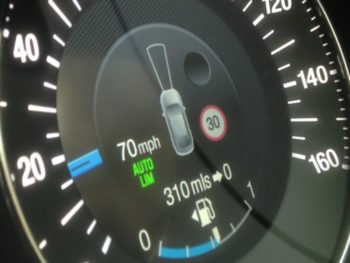Mandatory speed limiter tech could encourage opt-out drivers, warns CLM
Intelligent speed limiters, which could become mandatory on new cars in the next three years, are causing concern among drivers, with the majority expected to deactivate them and some drivers even liable to opt out of company cars.

It’s estimated that making overridable ISA a mandatory technology on all new vehicles could eventually reduce deaths on European roads by 20%
The plans by the EU, which are still subject to formal votes in the European Parliament and by Member States, would see a range of different systems become mandatory, including advanced safety features such as intelligent speed assistance (ISA) and autonomous emergency braking (AEB) with pedestrian and cyclist detection. According to TRL, which developed the standards, the full set of measures will save 25,000 lives by 2037 while it’s estimated that simply making ISA mandatory could eventually reduce deaths on European roads by 20%.
However, in the UK – which is expected to follow the measures regardless of Brexit – ISA continues to cause concerns among drivers, some of which are unaware that the system is both instantly overridable and can be completely deactivated by the driver while the technology also won’t actually brake the car. And according to CLM Fleet Management, increasing use of the tech on new cars ahead of mandatory implementation could even see drivers eschew new cars under fleet schemes to opt instead for older grey fleet vehicles.
Highlighting the need for increased fleet education on the technology, latest research by the firm of almost 300 UK motorists found that just under half thought the plan was a bad idea, while 54% would avoid purchasing a car with an automatic speed limiter entirely.
A total of 57% of respondents thought that the limiters were excessively controlling and fell under the umbrella of ‘big brother’ behaviour. Respondents also expressed scepticism that the devices would even be used, with 68% expecting drivers to turn them off for every journey, thereby rendering them useless. However, 45% of respondents agreed that ISA would have “a positive road safety benefit”.
In response, CLM said taking such driver sentiments into account would be a key factor in avoiding withdrawals from company car schemes and maintaining trust, particularly as the technology becomes more widely available in the run-up to mandatory implementation.
John Lawrence, managing director at CLM Fleet Management, said: “ISA has some clear benefits, not only from a safety perspective, but also when it comes to licence preservation. The technology can pick up accurate speed limits, potentially reducing speeding fines and penalties. This could be good news for the ‘road warrior’ community who are completely reliant on having their licences intact to make a living.
“However, for fleet managers looking to implement the technology our findings suggest it could be a difficult path ahead. Forcing the technology on drivers could prompt a backlash and damage fleet engagement. If this technology is to be successful, firms should consider a period of driver communication and consultation. This will allow them to both understand concerns and promote the potential benefits of ISA.”
His comments echo those of Thatcham published after the provisional deal on the mandatory car tech was reached.
Speaking at the time, the firm’s Matthew Avery warned there are limitations to current ISA systems, including that GPS mapping can be out of date and that temporary limits and road works can confuse the system too.
He added: “There could also be a danger that drivers ‘adapt’ to the system – and come to over-rely on it, planting their throttle to the floor in the expectation that the car will control the speed. This could be a distraction danger and lead to speeding fines if the system is not picking up the limit correctly. And drivers will still be liable, whether they were relying on the system or not.”
And Avery also agreed that education on ISA tech is key: “If the benefits of ISA systems are to be fully realised, consumers must be well-educated to instill confidence around safe and proper usage.”

















